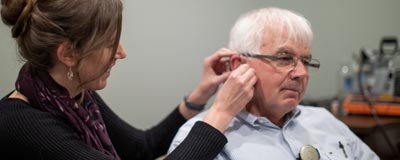It’s no surprise that our body’s overall health can affect our hearing systems. The ear is a phenomenal structure that is responsible for transmitting and transducing sound nearly instantaneously and relaying that information to our brain for processing and cognition. Within the ear, there are thousands of nerve endings and blood vessels. If our nerves and blood vessels are under stress we can cause significant damage on our hearing system. Lack of sleep or common sleep disorders can have adverse effects on our hearing. Individuals who consistently struggle sleeping or suffer from sleep disorders such as insomnia or sleep apnea may have several other health risks to watch out for as well.
What is Sleep Apnea?
Sleep Apnea is a sleep disorder that affects 1 in 5 adults. It causes their breathing to pause during sleep. In 2012, a study in Taiwan showed there were 3,200 reported cases of sudden hearing loss with 240 of their patients who were suffering from sleep apnea before experiencing hearing loss.
Similar to sudden hearing loss, sleep apnea is related to obesity and heart disease. Inflammation and change in blood vessels linked to sleep apnea could increase the risk of sudden hearing loss. The results published in Archives of Otolaryngology-Head & Neck Surgery showed that men who had experienced sudden hearing loss were 48% more likely to have previously been diagnosed with sleep apnea. This shows a clear link between the two disorders. Similar to hearing loss, sleep apnea is treatable.
What is Insomnia?
Insomnia is a common problem in adults. It is a subjective feeling of having difficulty in initiating or maintaining sleep. Furthermore, poor overall sleep quality increases by association. Individuals who suffer from insomnia are subject to many of the same side effects that individuals with sleep apnea endure. Common side effects are exhaustion and sluggishness. Moreso, individuals who suffer from sleep disorders have an increased chance of developing side effects like depression, heart disease, high blood pressure, stroke, diabetes, and obesity. Insomnia and Sleep apnea can have negative impacts on your hearing health, leading to hearing loss and worsening tinnitus symptoms.
How do Sleep Disorders Affect Hearing?
Sleep disorders are commonly associated with obesity and high blood pressure. There is a large link with inflammation and how it affects our inner ear. Inflammation of the blood vessels and arteries usually leads to damage of the lining within blood vessels and arteries. This causes narrowing and restriction or blockage of the blood flow resulting in tissue destruction and damage in those areas. Disturbances in circulation can lead to a variety of problems, including dizziness, hearing loss or tinnitus. When our foot falls asleep, we experience “pins and needles” when weight is put on it. That sensation dissipates as regular blood flow restores. The ear is a sensory organ that requires constant blood flow to work properly. Therefore, if blood flow is disturbed for long periods of time from conditions such as obesity and heart disease, it can have long term effects on our hearing.
It’s important to talk to your doctor about any sleep disorders or hearing loss you may be experiencing. If you are experiencing hearing loss or tinnitus, schedule an appointment with one of our hearing care professionals to find the best course of treatment.
References:
Sheu, J., Wu, C., & LIN, H. (2012). Association Between Obstructive Sleep Apnea and Sudden Sensorineural Hearing LossA Population-Based Case-Control Study. Archives of Otolaryngology–Head & Neck Surgery, 138(1), 55. doi:10.1001/archoto.2011.227
*Photo courtesy of Phonak Lyric – a very unique hearing aid that can be worn 24 hours a day, 7 days a week, even while you sleep.






